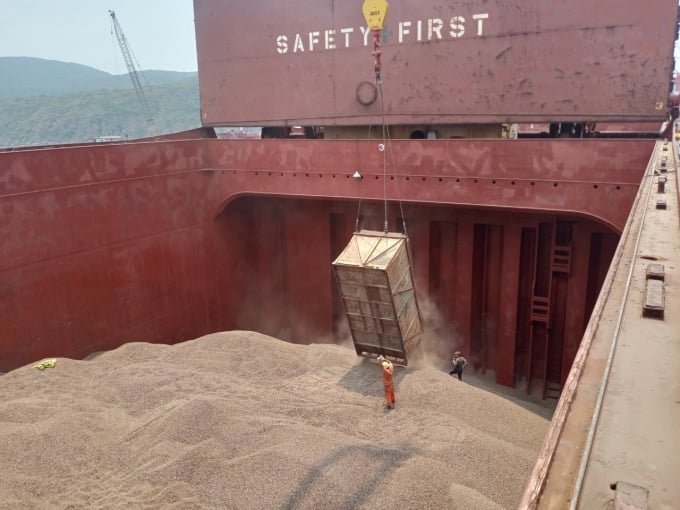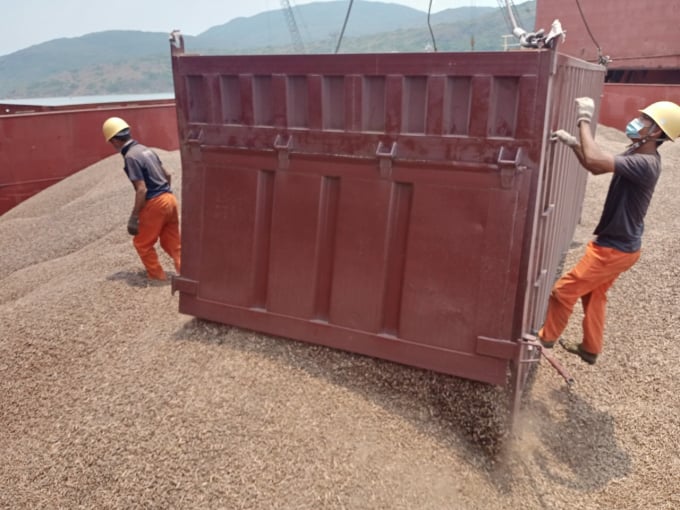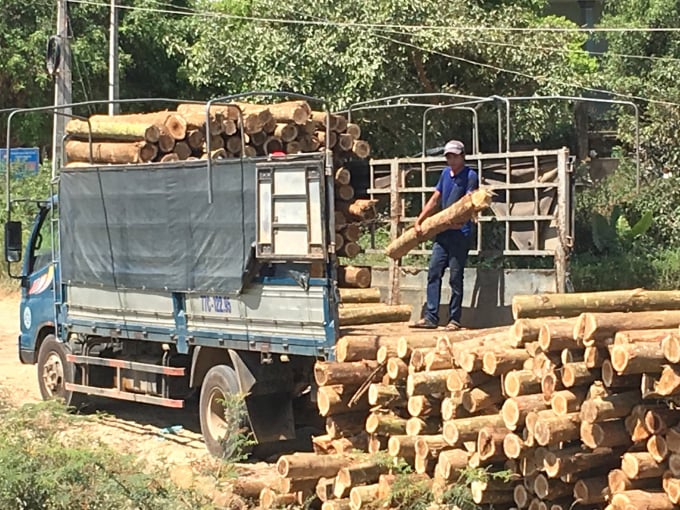November 27, 2025 | 21:20 GMT +7
November 27, 2025 | 21:20 GMT +7
Hotline: 0913.378.918
November 27, 2025 | 21:20 GMT +7
Hotline: 0913.378.918
According to a quick survey by the Vietnam Timber and Forest Product Association and Forest Trends, the situation of domestic wood processing enterprises ‘ production and export activities is very bleak. All traditional wood furniture import markets of Vietnam's wood industry have suffered in serious decline in recent times.

Pellets brought to Quy Nhon Port for export. Photo: V.D.T.
Revenue in the US market decreased by 39.6%, the EU market decreased by 41%, and the UK market decreased by 43%. The orders that export wood processing enterprises received from major markets also decreased sharply. Orders from the US market decreased by 45.4%, the EU market decreased by 44.6%, the UK market decreased by 47.3%, and other markets such as Singapore, Australia, Newzealand decreased by over 36%. It is prognosticated that 71% of wood processing enterprises will have their orders reduced in major markets by the end of 2022.
“In order to cope with this difficult situation, many businesses now give workers Saturdays off. They do not allow workers to work overtime, only 5 days a week, 8 hours a day. During this time, most businesses have streamlined their apparatuses to reduce production costs and product prices to stimulate demand and focus on high-value or specific product lines to reduce competition and be less susceptible to fluctuations because of world trends," said Vice President of Vietnam Timber and Forest Product Association Le Minh Thien.

Pellet processing - one of the industries that are "hoovering" up all planted forest wood in Vietnam. Photo: V.D.T.
Along with difficulties in the consumption market, export wood processing enterprises are currently facing a severe shortage of raw wood sources. Imported wood materials are increasingly scarce due to the impact of the Covid-19 pandemic and continuously increasing fuel prices, causing the supply chain to be broken.
There are 15 factories processing wood chips for export in Binh Dinh with a total capacity of over 1 million tons/year. Binh Dinh is also the province where dozens of pellet processing factories reside. The province currently has 128,510 ha of planted forest for production. Approximately 8,500 hectares are exploited and replanted each year, resulting in an output of 1 to 1.2 million tons of raw wood. In the context of the increasingly wood chips and pellets exports, there is fierce competition between wood chip and pellet processing factories in raw wood purchase to ensure production.

Planted forest wood used as raw materials for wood processing must have a large diameter. Photo: V.D.T.
Domestic acacia hybrid wood cost only VND 1.1 million/ton in 2021, but in 2022 the price of planted forest wood sometimes peaks at VND 1.8 million/ton, currently fluctuating at an average rate of VND 1.7 million/ton. In just one year, the price of domestic wood materials has increased by nearly 60%.
Chasing after the price, afforestation households are rushing to exploit young forests to sell. The age of logging in planted forests has been pushed down to less than 3 years. The diameter of harvested wood is less than 10 cm, leading to poor wood quality due to high humidity, lack of cellulose content, the wood is easily crooked, has many eyes. The density of wood after drying is very low, just under 400 kg/m3. Many planted forest areas, which are in the age of rapid growth, were exploited too early, affecting the environment and soil fertility.
That situation has pushed up the price of wood material unreasonably, causing the industries of wood processing, finger joint woodworking, and plywood manufacturing to suffer a serious shortage of raw materials from domestic planted forest wood.
Need banks to “offer a helping hand”
In face of a gloomy picture for the wood processing industry until the end of the year, the capital of enterprises is currently "buried" in inventory. This situation forces businesses to find many sources of capital so that they can buy raw materials to prepare for the new commodity season without breaking the production chain.
Binh Dinh Timber and Forest Products Association and banks therefore organized a workshop to review the overall picture of the domestic and international wood industry market and assess issues related to supply chains and value chains. The workshop analyzed the current timber import and export context as well as opportunities and challenges for Vietnam's wood industry in the medium term, from which financial and non-financial solutions were proposed to support businesses.
Translated by Samuel Pham

(VAN) According to Mr. Vo Minh Thanh, Director of the Tay Ninh Department of Agriculture and Environment, Resolution 57 has created a new development pathway for the locality, shifting from traditional toward modern agriculture.
/2025/11/26/4909-2-154329_878.jpg)
(VAN) Pearl grouper farming in HDPE cages not only delivers economic efficiency but also contributes to protecting the environment, creating jobs, and promoting marine-based experiential tourism.

(VAN) The model of making a living under the forest canopy through the agroforestry system in Van Son commune, Bac Ninh province, is expected to generate an annual income of approximately VND 30 million/ha.

(VAN) Many enterprises in Can Tho are harnessing natural energy and reducing greenhouse gas emissions in their production processes, thereby contributing to the promotion of a sustainable green transition.
/2025/11/24/3536-2-112800_176.jpg)
(VAN) Dong Nai now has tens of thousands of hectares of forests certified for sustainable management, and this area will continue to be expanded in the coming period.

(VAN) Vinh Ha hamlet (Dai Xuyen commune, Hanoi) is shifting away from small-scale farming as households adopt bioscurity into their breeder chicken models.

(VAN) Heavy rains make aquatic species more vulnerable to disease. Proactive water management and high-tech systems help farmers prevent outbreaks and protect yields.